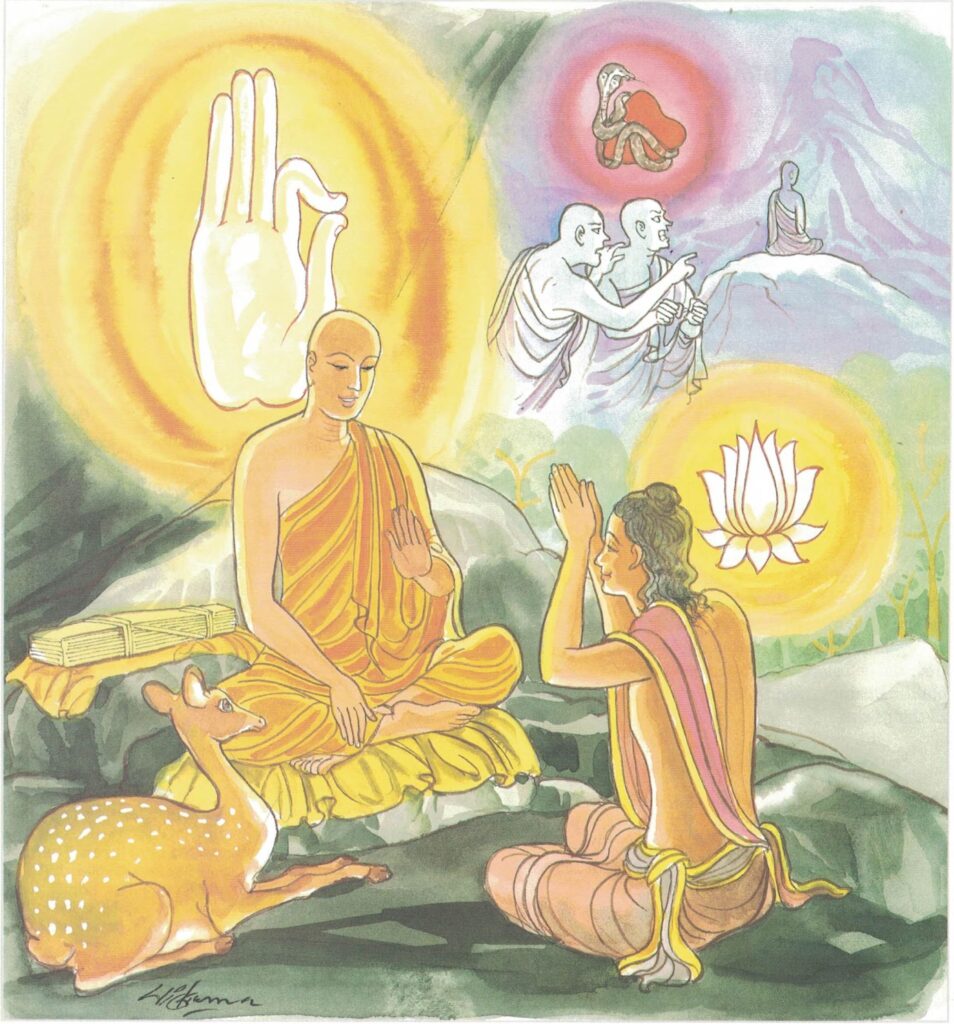Pali text, illustration and English translation of Dhammapada verse 408:
akakkasaṃ viññapaniṃ giraṃ saccaṃ udīraye |
yāya nā’bhisaje kañci tamahaṃ brūmi brāhmaṇaṃ || 408 ||
408. Who utters speech instructive, true and gentle too, who gives offence to none, that one I call a Brahmin True.

The Story of Venerable Piliṇḍavaccha
This verse was recited by the Buddha while he was in residence at Veluvana, with reference to Venerable Piliṇḍavaccha.
It seems that this elder monk was in the habit of accosting both laymen and monks with the epithet commonly applied only to outcasts. “Come, vile fellow! Go, vile fellow,” he would say to everyone he met. One day several monks complained about his conduct to the Buddha, saying, “Venerable Piliṇḍavaccha accosts the monks with an epithet applicable only to outcasts.” The Buddha caused him to be summoned before him. “Is the charge true, Vaccha,” said the Buddha, “that you accost the monks with an epithet applicable only to outcasts?” “Yes, Venerable,” replied Piliṇḍavaccha, “the charge is true.”
The Buddha called before his mind the previous abodes of that elder monk and said, “Monks, be not offended with the Venerable Vaccha. Monks, it is not because Venerable Vaccha entertains feelings of hatred within him, that he accosts his brother monks with an epithet applicable only to outcasts. The fact is, the Venerable Vaccha has passed through five hundred states of existence and in every one of these states of existence he was reborn in the family of a brāhmin. The use of this epithet has been habitual with him for such a long time that he now applies it to everyone he meets simply from the force of habit. He that has rid himself of the evil passions never makes use of words that are harsh and cruel, never makes use of words that cut hearers to the quick. It is solely from the force of habit that my son speaks thus.”
Explanatory Translation (Verse 408)
yāya kiñci n’ābhisaje akakkasaṃ viññāpaṇiṃ saccam
giraṃ udīraye taṃ ahaṃ brāhmaṇaṃ brūmi
yāya: if through even a word; kiñci: anyone; na ābhisaje: does not provoke; akakkasaṃ [akakkasa]: not harsh; viññāpaṇiṃ [viññāpaṇi]: well-meaning; saccam giraṃ [gira]: truthful words; udīraye: if someone utters; taṃ: him; ahaṃ: I; brāhmaṇaṃ brūmi: describe as a brāhmaṇa
His speech is true. His words are well-meaning, constructive and not harsh. By his words he will not give offence to anyone. Nor will his words provoke people. Such a person I declare a true brāhmaṇa.
Commentary and exegetical material (Verse 408)
Story of Piliṇḍavaccha: Piliṇḍavaccha was born a brāhmin at Srāvasti. Having listened to a sermon of the Buddha he was instantly converted. He sought ordination.
He had a habit of addressing all and sundry both in the Sangha and in the Laity by the term vasala signifying a person of low caste. He had acquired this habit during five hundred lives when he was born a brāhmin, for brāhmins regarded all others as below them. Piliṇḍavaccha could not get rid of this lapse by force of habit. It is said habit is second nature. In a person who had got rid of all defilements, still the habit acquired during a long period persisted. The Buddha was the sole exception. So when it became intolerable, monks complained to the Buddha.
The Buddhas explained to the audience what had happened. The Venerable Piliṇḍavaccha had no trace of hatred or ill-will when using the word. It was purely a habit. He had no venom. The Buddha proceeded to say Venerable Mahā arahat was free from all defilements. Such a person Buddha would call a brāhmin.
One day a seller of tippili or long pepper ran into serious trouble. Knowing not who Venerable Piliṇḍavaccha was, he was taking a wagon load of tippili for sale, having a sample of specimen tippili in a basket. When he met one morning the Mahā arahat at the gate of Jetāwanārama proceeding on a journey, as usual, mahā arahat addressed the seller as vasala and inquired what the basket contained. The seller was dumb founded. He retorted by saying excreta of mice. “Be it so”, said the Mahā arahat and went on his way. There was a striking similarity between long pepper and excreta of mice and the seller to his horror discovered that the specimen and then the wagon in turn consisted no longer of long pepper but excreta of mice.
The deities saw to it that the goods were turned into excreta of mice, even though it caused distress to the trader. The trader’s stock had sunk to zero. The poor man’s grief knew no bounds. In desperation he sought the Thera to give vent to his anger for he felt convinced that he was the cause. He met a well meaning person who questioned him. On hearing the story, he explained to the trader that Venerable Piliṇḍavaccha was a Mahā arahat and the remedy lay in his own hands. He was asked to meet the Mahā Thera again in the same way as in the fateful morning and when addressed, in the usual way, to be careful to reply simply that they were tippili. Then the Venerable Piliṇḍavaccha would say, “Be it so”. Then you would discover the true nature of your goods. The seller did so and was glad to retrieve his fortune, for instantly the goods of the trader were in the original state by the same process.
Afterwards, the Buddha addressing the noble Sangha and the laity declared that among his mahā arahats Piliṇḍavaccha was most pleasing to the deities.